
Prime Minister calls for ensuring housing for all Vietnamese citizens. Image: VGP
This afternoon (May 24), Prime Minister Pham Minh Chinh chaired a meeting of the Government’s Standing Committee with ministries, sectors, associations, banks, and businesses (including Vingroup and Sungroup) regarding the real estate market situation.
Deputy Prime Ministers, ministers, heads of ministerial agencies, representatives of leaders of ministries, sectors, associations, banks, and businesses in the real estate field and related fields attended the event.
Prime Minister: Ensure Housing for All Citizens
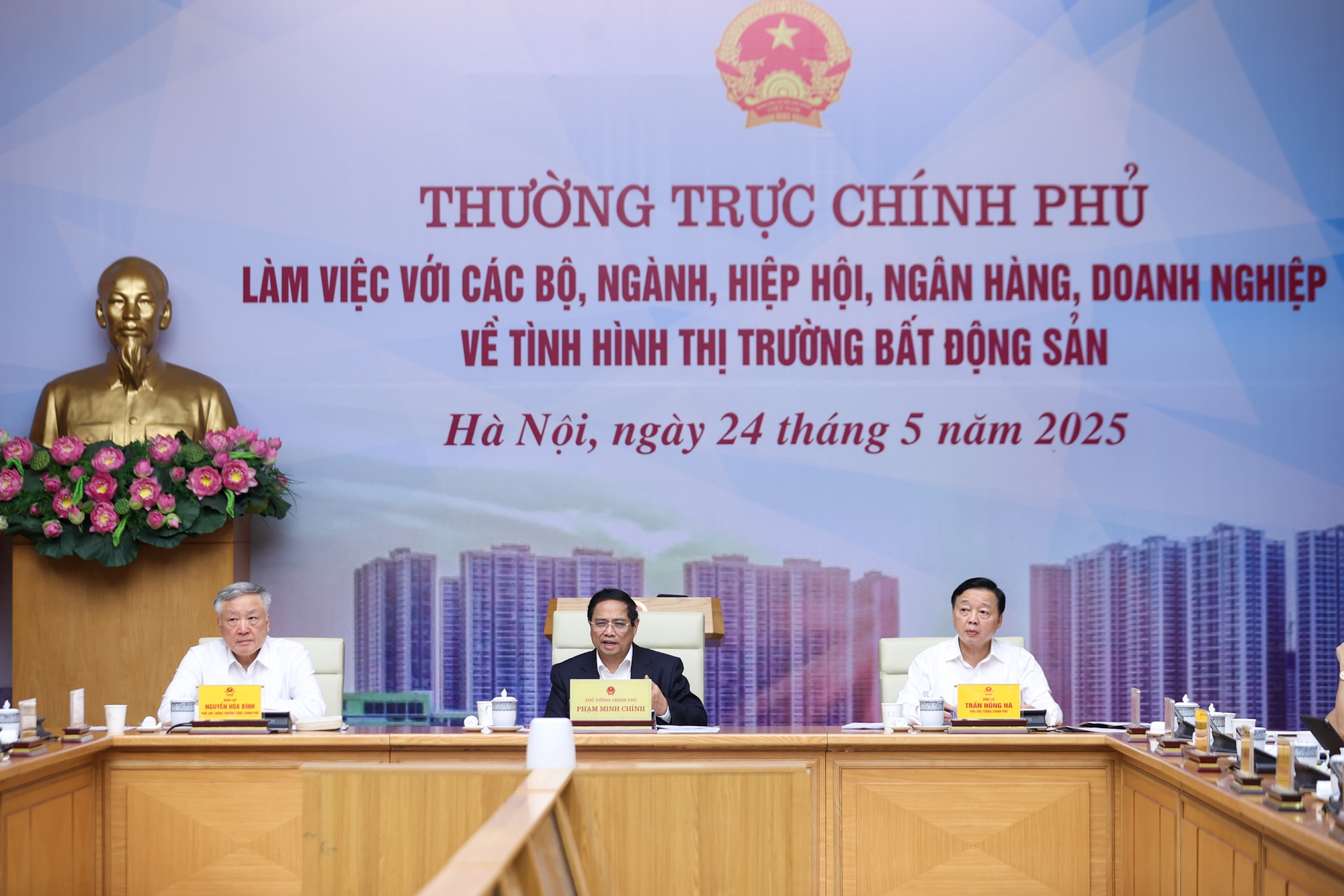
Prime Minister chairs the meeting of the Government’s Standing Committee with ministries, sectors, associations, banks, and businesses on the real estate market situation. Image: VGP
At the conference, after listening to the report from the Ministry of Construction and the opinions of the delegates, Prime Minister Pham Minh Chinh highly appreciated and recorded the delegates’ opinions. He also requested the Deputy Prime Ministers in charge of the fields to direct the relevant ministries and sectors to continue reviewing and proposing to the National Assembly to issue resolutions to remove obstacles and inadequacies in laws related to real estate, especially those with a “leveraging and supportive” nature.
In addition, the Prime Minister asked for a review and amendment of decrees and circulars in a simplified manner to ensure the safe, healthy, sustainable, and fair development of the real estate market, in alignment with the country’s conditions and people’s income. This will ensure that commercial housing, along with social housing and housing under the program to eliminate temporary and dilapidated houses, contributes to improving the housing conditions for the people, guaranteeing their right to housing, and achieving the goal of housing for all.
In the coming time, the Prime Minister requested that ministries and sectors study and remove obstacles to reduce real estate costs and prices, as well as increase the supply to enhance people’s access to real estate.
“There must be a resolute handling of acts that create virtual prices, speculate, manipulate, and take advantage of land auctions to distort the real estate market, so that people are not deceived,” the head of the government emphasized.
Furthermore, the State Bank should instruct commercial banks regarding housing loans to contribute to credit growth, reduce procedures, and create favorable conditions for people and businesses while ensuring control. They should also urge banks to participate in the VND 120,000 billion loan package, direct inspections, and focus on risk management without aiding violations that manipulate and create new price levels and virtual prices.
The Prime Minister requested the Ministry of Public Security to direct agencies and localities to inspect projects with signs of violations, initially allowing them to be resolved through economic measures before considering other measures, and prevent people from being deceived in relation to land issues. He also instructed fire prevention and control units to research high-tech solutions, improve fire prevention and control, and reduce costs for people.
At the same time, the People’s Committees of localities should strengthen the propagation of policies and publicly disclose real estate information so that people can access it fully, preventing objects from taking advantage of and deceiving people. They should also expedite administrative procedures and consider eliminating investment approval procedures.
Local People’s Committees should coordinate with ministries and sectors to develop resort real estate as there is a demand for it, prioritize the development of social housing, strive to complete social housing development targets, urgently build a database on land and housing, increase inspections to rectify, prevent, and handle violations, encourage those who perform well, and form real estate exchanges.
Especially, the Prime Minister suggested that enterprises proactively review and restructure their investment project portfolios to align with social needs, inspect ongoing projects to ensure compliance, reduce costs and expenses to lower housing prices, and share risks and benefits. They should also take responsibility and focus their resources on resolving difficulties and obstacles and completing legal procedures to soon implement projects and increase market supply.
Limited Real Estate Supply Affects Price Reduction
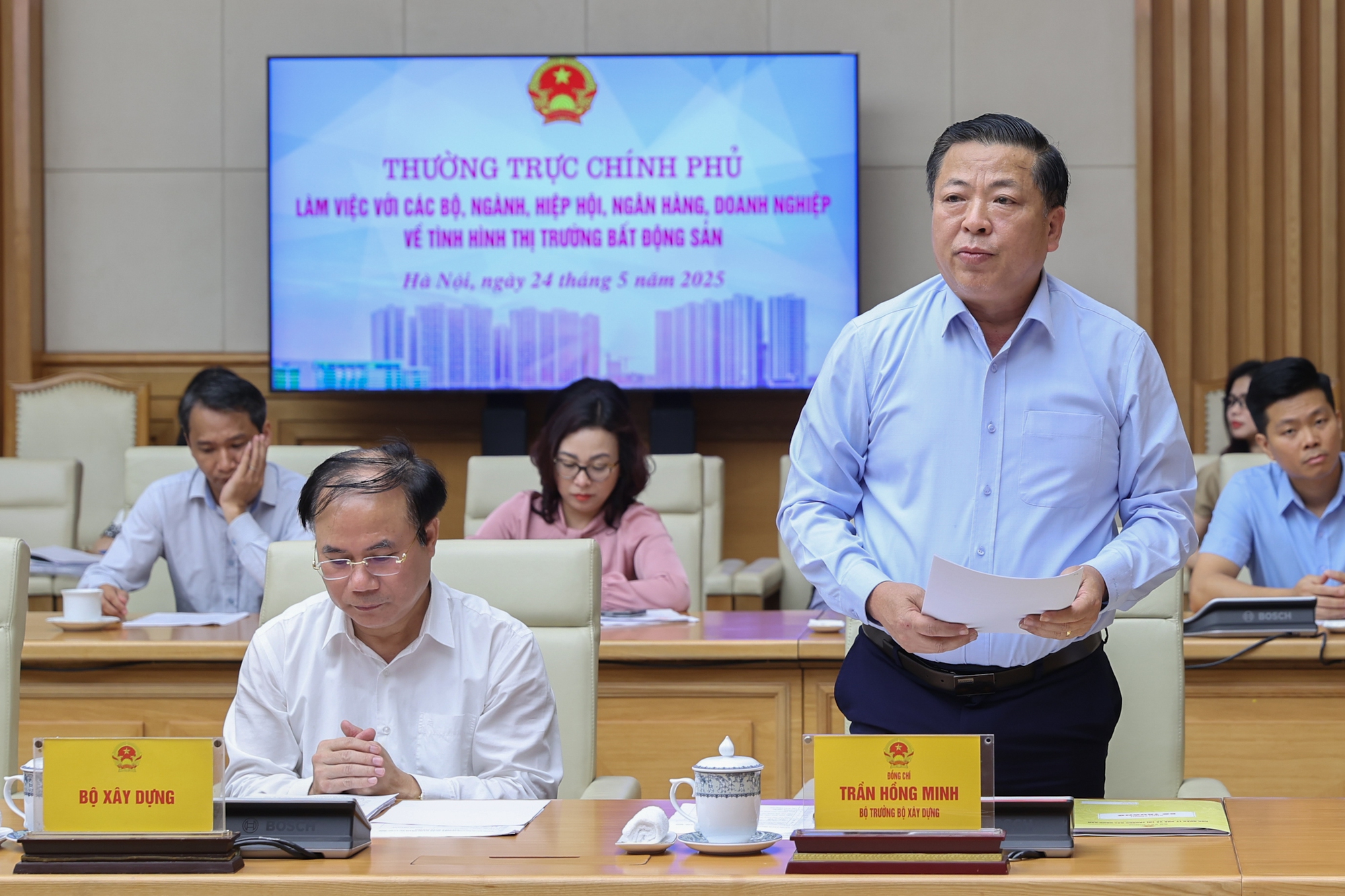
Minister of Construction Tran Hong Minh speaks at the conference. Image: VGP
According to the Ministry of Construction, in the first quarter of 2025, the number of commercial housing development projects increased compared to the fourth quarter of 2024 and the same period last year. Specifically, there were 14 additional commercial housing projects completed, with a scale of more than 3,800 units, an increase of 40%; 26 new licensed projects with a scale of nearly 16,000 units, an increase of 44%; 59 eligible projects for sale of houses formed in the future with about 20,000 units, an increase of 55%; and 994 projects under construction, with a scale of nearly 400,000 units.
For projects investing in infrastructure development to transfer land use rights for people to build houses by themselves, in the first three months of this year, there were 17 completed projects with more than 4,400 lots/plots, 490 projects under implementation with a scale of more than 19,000 lots/plots, and 11 licensed projects with a scale of about 3,400 lots/plots.
In addition, transactions of apartments, separate houses, and land plots all increased compared to the previous quarter. There were more than 33,000 successful transactions of apartments and separate houses, an increase of 32% over the fourth quarter of 2024, and more than 101,000 successful land plot transactions, an increase of over 16%.
According to the Ministry of Construction, in the first quarter of 2025, the prices of different types of real estate continued to show an upward trend, but the extent of the increase varied depending on the type, time, location, and region in each locality.
Notably, regarding social housing development, more than 1,300 locations nationwide have been planned, with an area of more than 9,700 hectares of land allocated for this purpose. Regarding the implementation of the project to build 1 million social housing units, there are currently 679 projects being deployed with a scale of more than 623,000 units. Among them, 108 projects have been completed, providing 73,000 units, and 155 projects have been started with a scale of more than 132,000 units.
According to calculations, 22 provinces and cities are expected to complete their social housing development targets with nearly 48,000 units, while 22 other localities are struggling to meet their targets, with more than 23,000 units. Notably, 19 provinces have not yet implemented social housing projects.
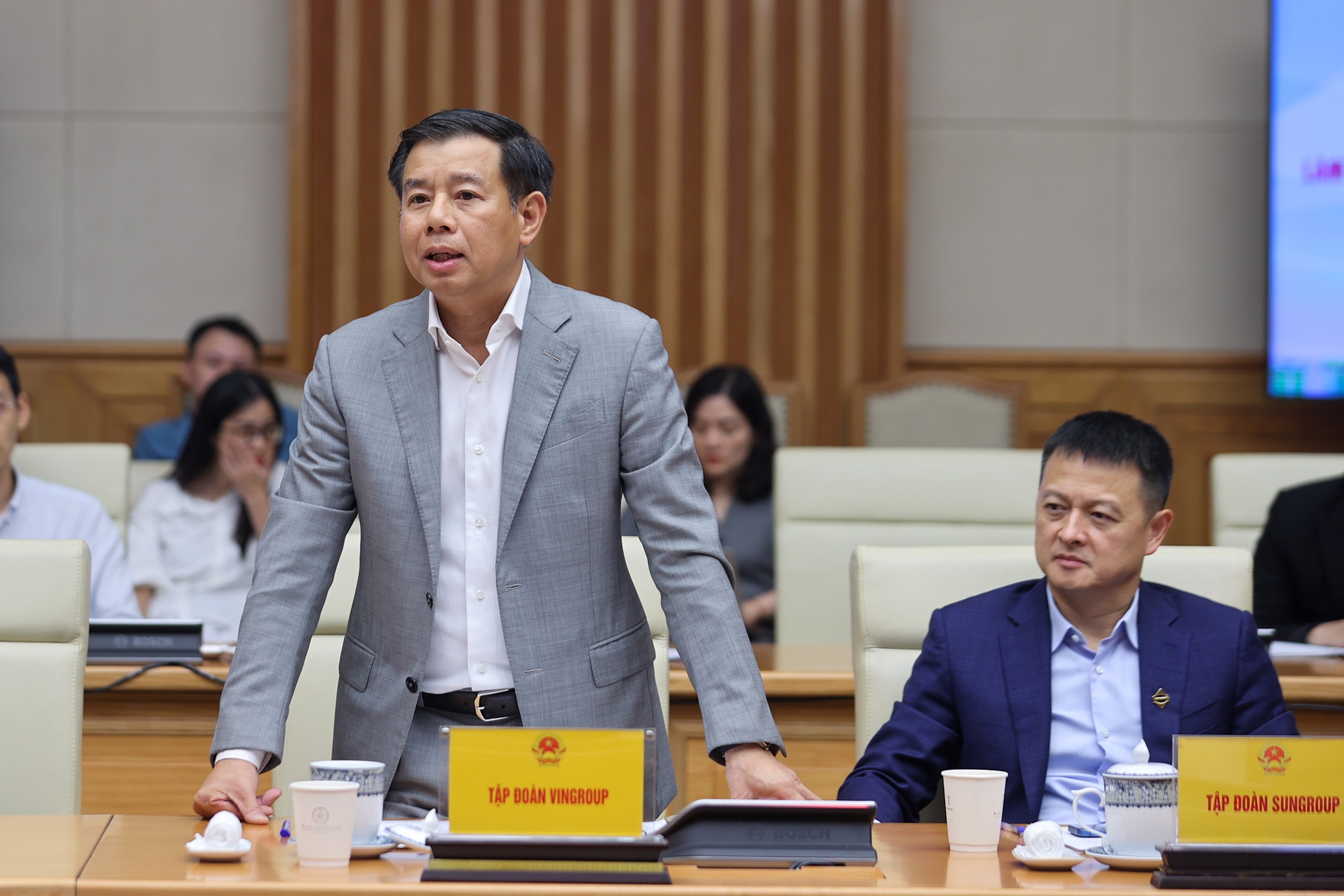
Representative of Vingroup’s leadership speaks at the conference. Image: VGP
The delegates at the conference assessed that the real estate supply is still limited, and there is a mismatch in the segments of the real estate market. The implementation of social housing projects is slow, and many real estate projects face obstacles related to legal procedures regarding land, investment, bidding, and construction. There are also difficulties and obstacles related to land price regulations, investment preparation procedures, and project implementation in many localities. In addition, the organization of land auctions in some localities has limitations and shortcomings.
Moreover, the management of real estate and brokerage activities is limited, with instances of virtual price creation and speculation. Enterprises face capital-related challenges, and fluctuations in other investment channels such as gold, securities, bonds, and inflation have impacted people’s and investors’ psychology, leading to a shift in capital flow to real estate.
In reality, there are about 788 real estate projects nationwide facing difficulties and obstacles related to land, investment, planning, construction, housing, bidding, and capital for project implementation, as well as the implementation of inspection conclusions for projects. These projects with difficulties and obstacles are being actively handled. However, there are still unresolved issues, mainly under the authority of localities.
The delegates proposed that, along with removing difficulties and obstacles for the real estate market as mentioned above, it is necessary to reduce costs that affect real estate prices, have plans and targets to regulate real estate segments reasonably, and strictly handle acts of price manipulation and market distortion.
Streamlined Reform Proposal: Slashing Red Tape from 300 to 75 Days to Salvage Social Housing Plans
“The current process of selecting a social housing investor through a tender process takes an average of 300 days, a lengthy and cumbersome procedure. However, with the implementation of proposed reforms, this duration could be significantly reduced to just 75 days. This radical transformation will streamline the process, making it more efficient and accessible for all involved parties.”
A Bold Reform Proposal: Slashing Processing Time from 300 to 75 Days to Revitalize Social Housing Projects
“The current process of selecting a social housing project investor through a tender process takes an average of 300 days, a lengthy and cumbersome procedure. However, with the implementation of proposed reforms, this duration can be significantly reduced to just 75 days. This radical transformation will not only streamline the process but also open up opportunities for efficient and effective project development, ensuring timely delivery of much-needed social housing initiatives.”
“A Worker’s Wages: Earning a Living, Paying Off Debt”
Even with social housing priced at a range of 400 to 500 million VND, a monthly factory worker’s salary of 7 million VND would require them to allocate 5 million VND for debt repayment of principal and interest to the bank.
“Luxury Apartments: Prime Location, Unbeatable Price”
The Phu Lam Social Housing Project is an exceptional initiative offering a unique opportunity for individuals to own affordable homes. With prices at an incredible rate of less than 14 million VND per square meter, this project is a rare gem in the real estate market, boasting rates three times lower than those advertised by competitors. This project stands out as one of the few qualified projects accepting applications for social housing purchase after a 5-year rental period.

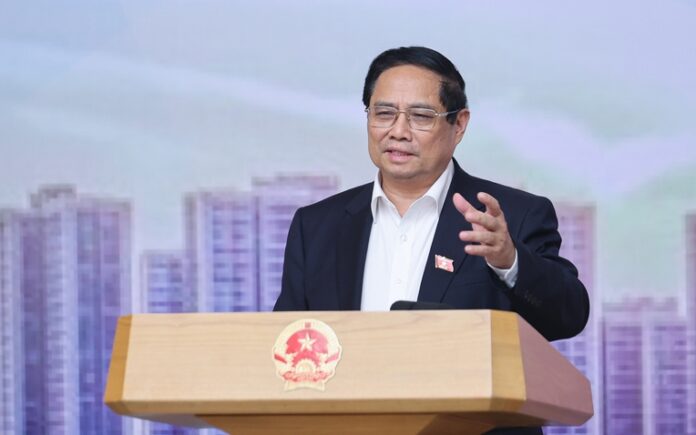
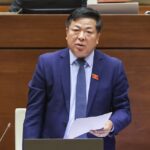
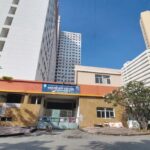
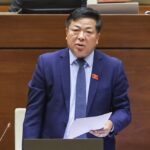
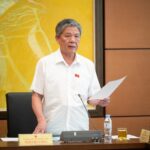
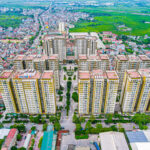



![[Photo Essay]: Experts, Managers, and Businesses Unite to Forge a Path Towards Sustainable Green Industry](https://xe.today/wp-content/uploads/2025/07/z678592918-150x150.jpg)


![[Photo Essay]: Experts, Managers, and Businesses Unite to Forge a Path Towards Sustainable Green Industry](https://xe.today/wp-content/uploads/2025/07/z678592918-100x70.jpg)






